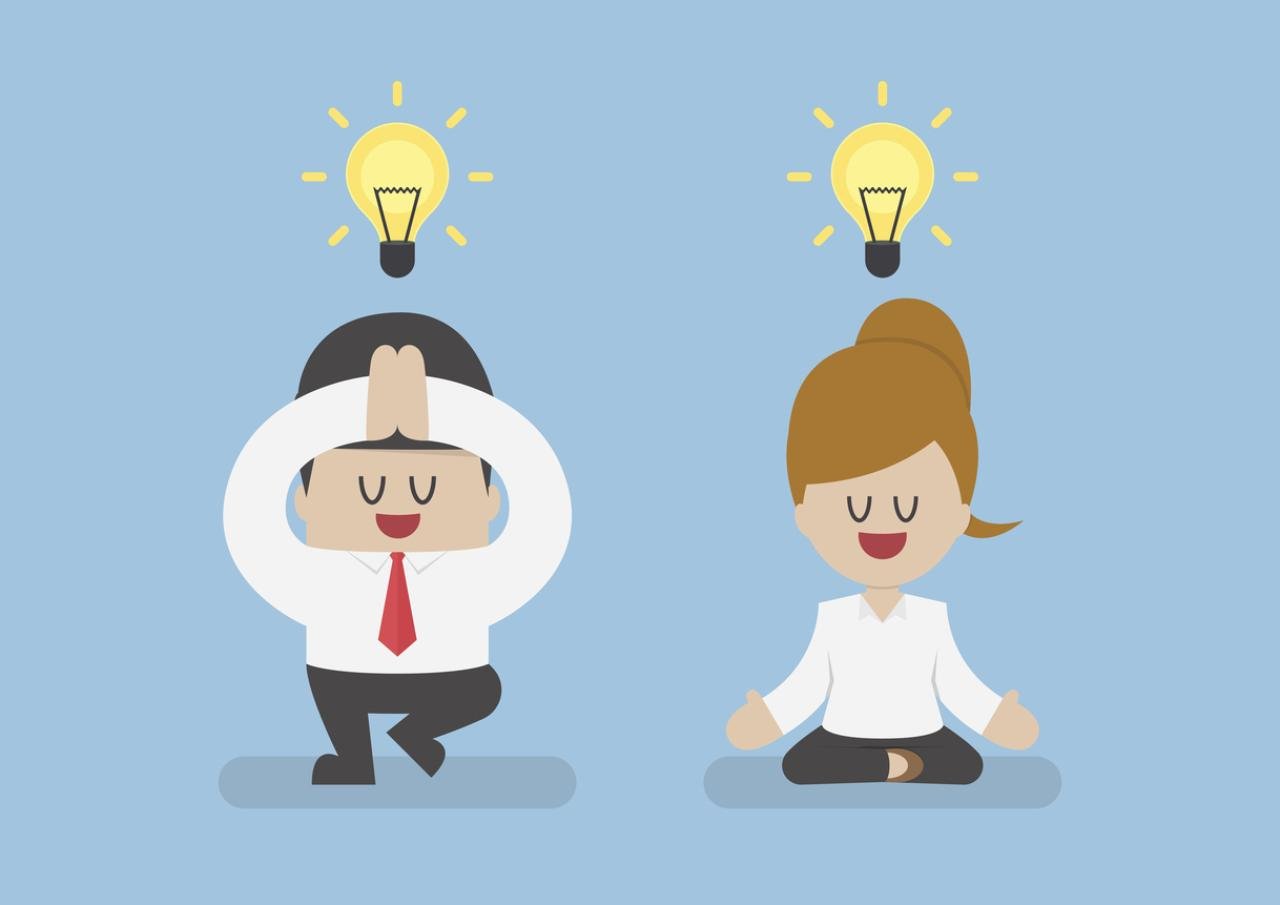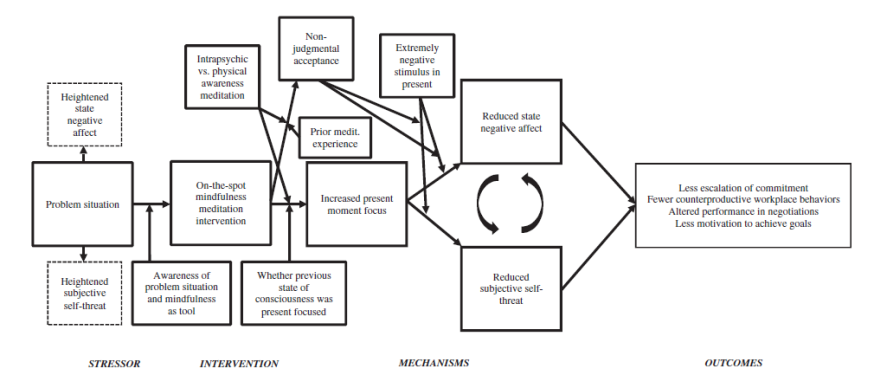
Research has found that workplace stress is related to job dissatisfaction, feelings of burnout, absenteeism, higher odds of quitting and even increased risk of heart disease. One effective way to reduce or handle stress is to engage in mindfulness meditation, a practice that cultivates awareness of the present moment. Recognising the benefits of the practice, a diverse group of organisations, including Google, Intel, General Mills, the Seattle Seahawks and the U.S. Marines, have all created mindfulness-based meditation programmes for their employees.
In most of its workplace applications, mindfulness is defined as long-term training involving nearly an hour of meditation almost every day. Such training is meant to change people’s psychological routines so they focus more on the present moment and less on the past and future, even when they’re not meditating.
While there are many benefits to such an approach, there are also potential costs. For example, focusing on the past can allow us to learn from and make sense of events, figure out who we are and find more meaning in our lives. Focusing on the future can help us develop and pursue clear goals, as well as foresee and prepare for potential problems. If a person never paid attention to the past or future, he or she would learn less from mistakes, be less self-aware, have lower motivation, be caught unawares more often by unpredictable circumstances and feel their life has less meaning.
Speed meditation
My research focuses on the use of a shorter form of mindfulness, applied in specific situations to help people feel and perform better in ways that matter in the workplace. With this approach, a person meditates between 8 and 15 minutes, perhaps with the help of a guided meditation audio recording, to achieve a temporary state of mindfulness.
Such an on-the-spot mindfulness intervention has a few advantages: it requires less time and money; it provides the benefits of mindfulness precisely when needed; and it lessens focus on the present moment when such mindfulness could be ineffective or even backfire. This research culminated in a practical theory article published this month in the Journal of Business Research, summarising my findings on mindfulness with specific instructions for how corporations, managers and employees can effectively use it on-the-spot.
The article presents a model of when, why and how on-the-spot mindfulness is likely to help or hinder specific aspects of job performance. Under the right conditions, it can reduce negative emotions and make people feel less threatened in stressful situations, thus ensuring better conflict resolution. Mindfulness can also inspire people to cut their losses sooner or improve their strategy, in part by helping them admit when they are wrong. Conversely, if practised at inappropriate times, on-the-spot mindfulness could reduce one’s motivation to achieve goals.
Mindfulness meditation for negotiators
In a negotiation setting, on-the-spot mindfulness has been shown to produce mixed results. Depending on the cultural environment, it can enable people to notice more information and create more value (a finding in East Asia or in collaborative situations) or it can reduce negotiation performance (for instance, in American contexts or in competitive situations).
In my paper, I also argue that physical awareness forms of meditation (such as focused breathing or body scans) cultivate awareness of the present moment. Meditation in which attention is focused on thoughts or emotions could distract the meditator with past issues or worries about the future.
The model can be presented visually as follows.

The good side of negative emotions
We often have a certain psychological momentum, or “edge”, towards what we are doing; it pushes us to perform well but can also make us react in counterproductive ways when we don’t get what we want. Mindfulness tends to take the “edge” off, for better or worse.
Moderate negative emotions are not necessarily harmful as they can give us the energy or focus to perform well. Thus, when we are feeling bad and considering whether to meditate, we can ask ourselves: Could these negative feelings help me perform better? Can I reframe my anxiety as excitement and let it carry me? Can I channel my frustration into motivation to work harder or become more competitive? If the answer is yes to any of these questions, meditation might be best avoided lest it interrupts useful processes. But when negative emotions become overwhelming or when the task at-hand (e.g. creative thinking) requires a more pleasant frame of mind, on-the-spot mindfulness meditation may be a useful tool to feel and perform better.
Three factors for proper implementation
The potential for wide and effective use of on-the-spot mindfulness hinges on three factors.
First, employees need to realise when they find themselves in a situation where mindfulness would be helpful, such as when facing up to the consequences of bad decisions, receiving negative feedback or being treated unfairly by co-workers or a supervisor.
Second, employees need to know what mindfulness is. They need to be assured that it can be a secular practice – as a matter of fact, workplace programmes should never be tied to religion or spirituality – and that its benefits can be experienced easily and immediately.
Third, people need to be provided with a physical and social environment that enables them to actually practise meditation.
What remains within our control
To fulfil these conditions, people need information, amenities such as guided meditation recordings or a dedicated meditation room, as well as signals from management that meditating at work will not be punished even though it takes time away from other tasks. All of the above requires serious consideration, and in some cases could be considered too much by management.
We can choose, to a larger extent than many people realise, how we feel in a given moment. It is up to us whether to follow our initial impulses or let incidental pains become full-blown suffering. We do have some control over our mental life and are not obliged to follow our mind wherever it wanders. Remembering that we have this power can help us improve our professional and personal lives.
Andrew Hafenbrack is an Assistant Professor of Organisational Behaviour at Católica Lisbon School of Business and Economics, Universidade Católica Portuguesa. He has a PhD in Management from INSEAD.
-
View Comments
(3) -
Anonymous User
>Sorry I was relating to some questionnaire just prior to your proposed article, which I read and found interesting..
Anonymous User
Andrew has thoroughly misunderstood mindfulness practice! Practising mindfulness does not mean not thinking about the past and the future – no one could live that way! Also, if one has a thought relating to the past or the future – that thought is HAPPENING IN THE PRESENT MOMENT! So, one can be mindfully aware of that thought and can even proliferate that thought if it is a useful idea (e.g. a creative idea) for example. Also, people are not so stupid to not seek out solutions to any challenges in life just because they are practising mindfulness! (an idea mentioned in the published paper is that people may not respond to challenges!).
I noticed this article is also written as if we are fully in control of our mind! Even neuroscience research has consistently demonstrated that our thoughts happen automatically. Additionally, research has consistently shown that rumination is a significant risk factor for mental problems and that mindfulness significantly reduces rumination. This is where mindfulness practices can greatly benefit people – and it is only with a great deal of practice that someone is able to focus on the present without engaging in rumination. It took me years, and I am much better (but am still practising – practice gives me joy and is also useful for ALL avenues of my life).
When practising mindfulness, one can grow and benefit from any negative emotions fully (remember that mindfulness is NOT about supressing, but about being aware of how various emotions come and go). Lastly don’t forget that Steve Jobs (for whom meditation was an important part of his life) was motivated enough to found a company that ultimately became the first trillion dollar company in US!
I can’t believe that academic journals publish such low quality research!
-
Leave a Comment





Anonymous User
31/03/2017, 11.31 am
Paying attention is essential for a successful life. Paying close attention to financial deals without getting emotionally involved is a tried and true method for success. Meditation and mindfulness are all about paying attention without emotional involvement. So it is logical that these practices would be beneficial to anyone involved in finance, investment or even household budgeting as well as when making major purchases.
As a psychotherapist, I have worked with many business clients over the years and have taught all of them mindfulness meditation. I have found that the practice of mindfulness meditation makes them more open and able to innovate far better than before they began their mindfulness practices. Every client who meditates also becomes a far better negotiator as well as a convincing spokesperson.
We all know that it is essential to be calm and objective during a negotiation. Being able to ‘read the room’ is also a powerful skill. Meditation will enhance these skills. Practicing meditation on a regular basis before you need these skills is essential though. You cannot become effective at meditation by just thinking about doing it.
Often it is helpful to have some guidance or a teacher when beginning to do meditation. When a teacher is not available or possible I highly recommend the guided meditation training downloads by Jon Shore at http://www.lightunlimitedpublishing.com to most of my clients since they are very effective.
One can argue all day about the effectiveness of meditation or mindfulness or one can try it and see for oneself. I usually recommend the second option.